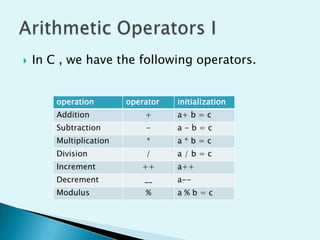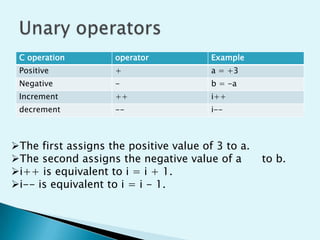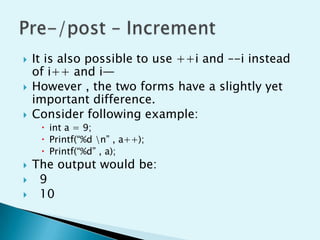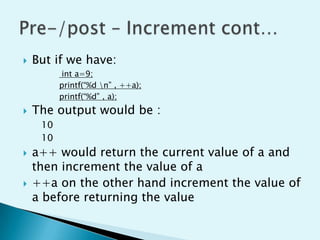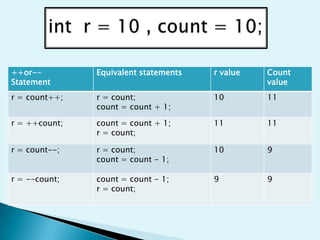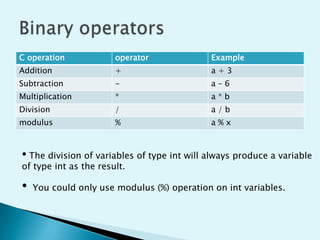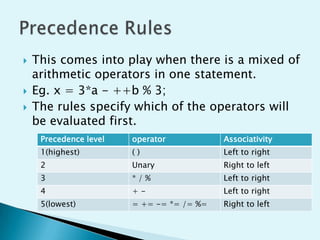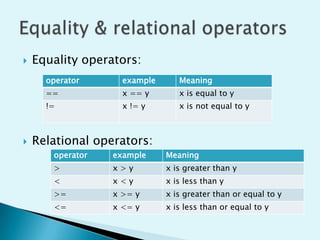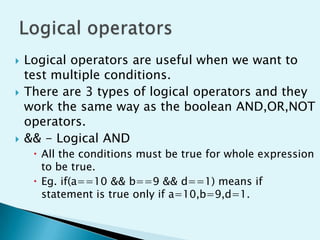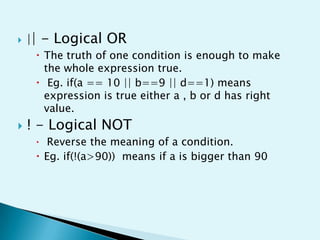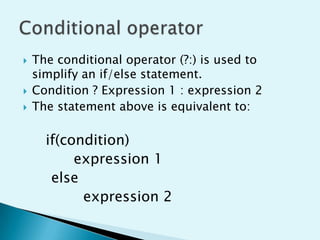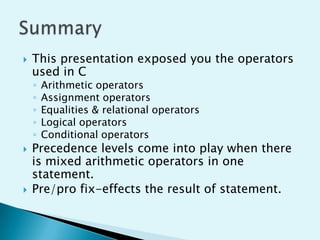Basic c operators
- 3. Arithmetic operators 1. Unary operators 2. Binary operators ï― Assignment operators ï― Equalities and Relational operators ï― Logical operators ï― Conditional operators ï―
- 4. ï― In C , we have the following operators. operation operator initialization Addition + a+ b = c Subtraction - a-b=c Multiplication * a*b=c Division / a/b=c Increment ++ a++ Decrement __ a-- Modulus % a%b=c
- 5. ï― There are two types of arithmetic operators in C: 1. Unary operators: âĒ Operators that require only one operand 2. Binary operators: âĒ Operators that require two operands.
- 6. C operation operator Example Positive + a = +3 Negative - b = -a Increment ++ i++ decrement -- i-- ïThe first assigns the positive value of 3 to a. ïThe second assigns the negative value of a ïi++ is equivalent to i = i + 1. ïi-- is equivalent to i = i - 1. to b.
- 7. ï― ï― ï― It is also possible to use ++i and â-i instead of i++ and iâ However , the two forms have a slightly yet important difference. Consider following example: ï int a = 9; ï Printf(â%d nâ , a++); ï Printf(â%dâ , a); ï― ï― ï― The output would be: 9 10
- 8. ï― But if we have: int a=9; printf(â%d nâ , ++a); printf(â%dâ , a); ï― The output would be : 10 10 ï― ï― a++ would return the current value of a and then increment the value of a ++a on the other hand increment the value of a before returning the value
- 9. ++or-Statement Equivalent statements r value Count value r = count++; r = count; count = count + 1; 10 11 r = ++count; count = count + 1; r = count; 11 11 r = count--; r = count; count = count - 1; 10 9 r = --count; count = count - 1; r = count; 9 9
- 10. C operation operator Example Addition + a+3 Subtraction - aâ6 Multiplication * a*b Division / a/b modulus % a%x âĒ The division of variables of type int will always produce a variable of type int as the result. âĒ You could only use modulus (%) operation on int variables.
- 11. ï― ï― Assignment operators are used to combine the â=â operator with one of the binary arithmetic operators. in following, c=9 operator example Equivalent statement Result += c += 7 c=c+7 c = 16 -= c -= 8 c=câ8 c=1 *= c *= 10 c = c * 10 c = 90 /= c /= 5 c=c/5 c=1 %= c %= 5 c=c%5 c=4
- 12. ï― ï― ï― This comes into play when there is a mixed of arithmetic operators in one statement. Eg. x = 3*a - ++b % 3; The rules specify which of the operators will be evaluated first. Precedence level operator Associativity 1(highest) () Left to right 2 Unary Right to left 3 */% Left to right 4 +- Left to right 5(lowest) = += -= *= /= %= Right to left
- 13. ï― Equality operators: operator Meaning == x == y x is equal to y != ï― example x != y x is not equal to y Relational operators: operator example Meaning > x>y x is greater than y < x<y x is less than y >= x >= y x is greater than or equal to y <= x <= y x is less than or equal to y
- 14. ï― ï― ï― Logical operators are useful when we want to test multiple conditions. There are 3 types of logical operators and they work the same way as the boolean AND,OR,NOT operators. && - Logical AND ï All the conditions must be true for whole expression to be true. ï Eg. if(a==10 && b==9 && d==1) means if statement is true only if a=10,b=9,d=1.
- 15. ï― || - Logical OR ï The truth of one condition is enough to make the whole expression true. ï Eg. if(a == 10 || b==9 || d==1) means expression is true either a , b or d has right value. ï― ! - Logical NOT ï Reverse the meaning of a condition. ï Eg. if(!(a>90)) means if a is bigger than 90
- 16. ï― ï― ï― The conditional operator (?:) is used to simplify an if/else statement. Condition ? Expression 1 : expression 2 The statement above is equivalent to: if(condition) expression 1 else expression 2
- 17. ï― This presentation exposed you the operators used in C âĶ âĶ âĶ âĶ âĶ ï― ï― Arithmetic operators Assignment operators Equalities & relational operators Logical operators Conditional operators Precedence levels come into play when there is mixed arithmetic operators in one statement. Pre/pro fix-effects the result of statement.




